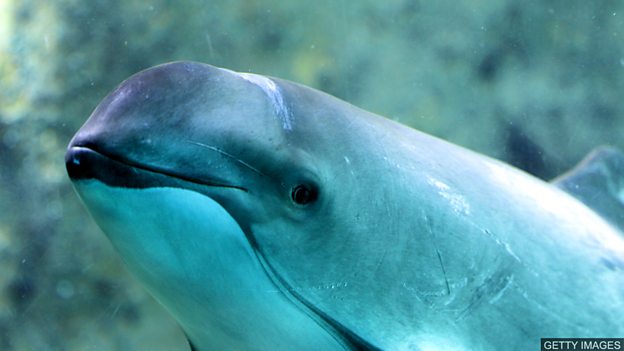媒体英语
Ocean pollutants 'have negative effect on male fertility' 海洋污染物 “对雄性鼠海豚生殖能力有负面影响”

有长效危害的被禁工业化学品可能威胁到在英国附近生活的雄性鼠海豚的生殖能力。多氯联苯在几十年前就被逐渐淘汰了,但这种物质会在鲸鱼、海豚和鼠海豚的体内积聚。
PCBs were once used in everything from plastics to paints. They were banned in the 1980s, but the chemicals take a long time to break down and can linger in the oceans, accumulating in the blubber of whales, dolphins and porpoises.
多氯联苯曾经被应用于从塑料到油漆的各类产品中。尽管在20世纪80年代,多氯联苯已被禁用,但这种化学物质需要很长时间才会分解,而且会滞留在海洋中,在鲸鱼、海豚和鼠海豚的鲸脂中积聚。
Scientists have long suspected PCBs might reduce the pregnancy rate of females. Now, research on hundreds of harbour porpoises washed up around the UK over the past decade raises concerns about male fertility too.
科学家们一直怀疑多氯联苯可能会降低雌性的妊娠率。现在,对过去十年中在英国各地被冲上岸的数百只港湾鼠海豚的研究,又引起了人们对雄性生殖能力的担忧。
Scientists at the Zoological Society of London say harbour porpoises exposed to PCBs had smaller testicles, suggesting an effect on sperm count and fertility. They say while this is preliminary research, which needs to be confirmed, more must be done to clean up the oceans.
英国伦敦动物学会的科学家们表示,暴露在含有多氯联苯的环境下的港湾鼠海豚睾丸较小,这表明多氯联苯对其精子数和生殖能力有所影响。他们说,虽然这是初步研究,仍需确认,但人们必须做更多的工作来清理海洋污染物。
词汇表
PCBs (polychlorinated biphenyls) 多氯联苯
chemicals 化学物质,化学品
break down 分解
linger 滞留
accumulating 积聚,积累
blubber (海洋动物的)鲸脂
porpoises 鼠海豚
pregnancy rate 妊娠率
washed up 被冲上岸的
fertility 生殖能力
sperm count 精子数
阅读理解:请在读完上文后,回答下列问题。
1. True or false? PCBs can stay in the oceans for a long time.
2. When were PCBs banned?
3. What have scientists long suspected about the effect of PCBs?
4. What concerns does the new research raise?
答案
1. True or false? PCBs can stay in the oceans for a long time.
True. The chemicals take a long time to break down and can linger in the oceans.
2. When were PCBs banned?
They were banned in the 1980s.
3. What have scientists long suspected about the effect of PCBs?
Scientists have long suspected PCBs might reduce the pregnancy rate of female whales, dolphins and porpoises.
4. What concerns does the new research raise?
The new research on harbour porpoises raises concerns about PCBs reducing male fertility too.



